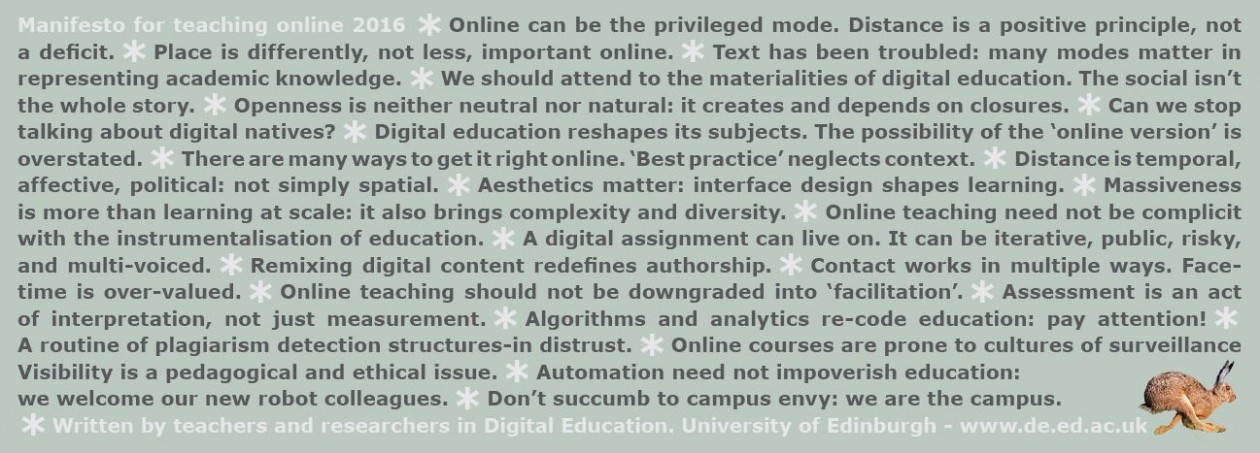Another take from one of the contributors to the manifesto.
First of all, let’s set aside the notion that people who are “teachers” are not simultaneously, and ipso facto, concerned with their own learning. That said, they are also people who have chosen, or have been commissioned, to take some responsibility for the support of the learning of others. One must emphasise some responsibility, as it is important not to allow people to feel robbed of their own agency in the matter of personal development. But we feel that there is, nevertheless, a place for the function known as “teaching”, and that the nature of this function has been rather overlooked in recent years, in the context of an otherwise thoroughly correct emphasis on the importance of the agency of the individual in their own learning. What is it that one should most usefully do within the zone of proximal development? Clearly not just stand aside and wait. The possibility then, is that there is a scholarship surrounding that role. This is what we are seeking to explore in our own practice, with our students and colleagues, and what we call “teaching”.
“Facilitation” is a benign, though rather vague construct, that conveys the notion of assisting another towards some goal which the other owns, without oneself taking any ownership for the outcome. At worst, and in its most dangerous form in education, the concept might be used to legitimise standing aside, and leaving the learner to their own devices. Although this is not the way that it is normally used in the rhetoric of learning and teaching, it leaves that possibility open for exploitation. More importantly however, the notion of facilitation provides no guidance for action in a learning context. It is understood primarily by what it prohibits – control, instruction, interference with the agenda and motivation of the learner, and so on. It gives no lead on any active or collaborative stance on the part of the one we will call, for want of a better word, the “teacher”. The notion of facilitation is helpful. At times, it will be absolutely right to stand aside, and provide nothing more than affirmation. Noting, of course, that affirmation is a conscious act. But there are times when preparation, intervention, critique and evaluation will be called for, from an agent outside of the learner. Some of the other manifesto statements seek to expose the tensions that these activities bring. It is important to understand too, that while the learner must own the learning objectives, they espouse those objectives in a social context, and for social purposes. Understanding one’s place in all of this constitutes a scholarship of teaching.

This is really thought provoking, thank you Hamish.
It reminds me of the way in which many teachers readily undervalue/underestimate their role in the whole learning process. I hear colleagues (and myself) saying ‘I just facilitate their learning’ – as you say there is a lack of ownership over what is happening despite the commitment and effort to provide students with rich learning opportunities as well as the teaching that takes place. We have a toolkit and are ready to pick the right strategies for the right situation and learners, and that’s what makes it effective.
We need to recognise the value of what we’re doing in order to continue to develop and enhance.
Reblogged this on Inspire to learn.
I enjoyed the manifesto – thought it was a bit long though. I have written about it – http://bit.ly/znQyxt – with some analysis of the ten points I think are most important and suggestions for trimming it down as well as one omission.
Good work and an excellent start to a much needed discussion.
@drjwmarquis